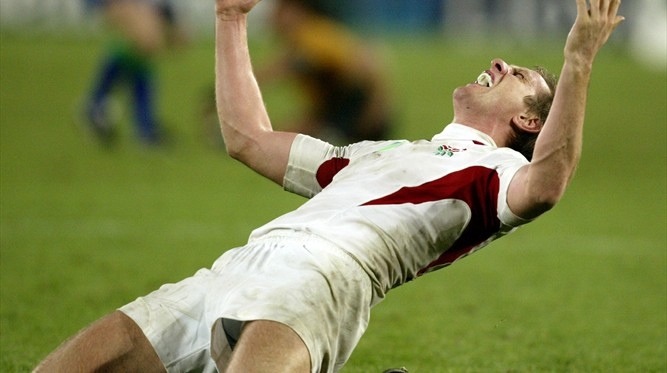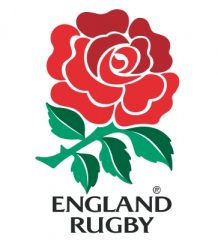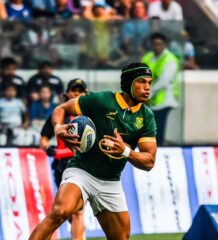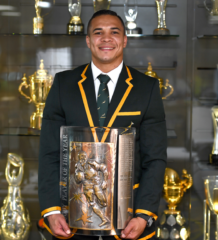10 years on … a commentator’s point of view
Today marks exactly 10 years since England tasted Rugby World Cup 2003 glory with extra-time victory over Australia in Sydney, but for many the memory of that triumph remains fresh in the mind – including the two men who were responsible for conveying all the drama to a worldwide television audience of millions.
Veteran broadcaster and former international John Taylor was behind the microphone for ITV in the UK and guided 18 million viewers through a roller-coaster ride, while the equally venerable Gordon Bray took on those duties for Channel 7 in Australia, and an expectant host nation.
Graham Jenkins talks to both men about their recollection of the tournament and one of the most sensational matches in Rugby World Cup history.
How did you prepare for the biggest match in the sport’s history?
John Taylor: “My preparation has always been the same since my first commentating experience as Bill McLaren’s second voice and I saw the way he prepared – his famous crib sheets. Even though one knew virtually everything one needed to know having done Australia and England a lot, part of the routine was always to sit down for about four and five hours the day before and prepare a crib sheet and always look for something new. It was all part of the process of freshening yourself up and it is almost what triggers you to get ready for the big game.”
Gordon Bray: “I had called the 1987, 1991 and 1999 finals so had certainly been in that situation before. I think your best calls in these huge matches come from the spontaneous clashes where the element of surprise really dominates. It brings out the best in a commentator.”
What sort of contest did you anticipate in the final?
JT: “At that time they (Australia) were still very hard to beat on their own soil and this was why England’s victory there earlier in the year was fundamental in terms of confidence. I always felt Australia would be good and tough especially after they beat New Zealand fairly convincingly.”
GB: “There was no doubt in my mind that Australia had been the best side in the world that year. I expected them to win and after their semi-final upset against New Zealand we also knew they would go at England. Two heavyweights would slog it out over the distance and as it happened we went to extra-time.”
Aside from the sensational finale, what sticks in the mind?
JT: “You just felt worried all the way through. Every time you thought England were establishing their dominance up front and were going to use that as the platform for victory, they would get penalised. Those penalties were crucial because they were the things that kept bringing Australia back into the contest and you started to think that it was going to be one of those days when nothing comes right.
“One incredible moment was when Ben Kay had that golden chance – all he had to do was catch the ball and flop over the line and he dropped it. That, in the context of a game that was so tight would have given them clear water. There was huge anxiety in terms of the result and it was a messy game to commentate on because of that.”
GB: “When I saw Lote Tuqiri score over the top of Jason Robinson and that sheer mismatch, I thought the script was going perfectly to plan. I suppose when Elton Flatley was able to level the scores and take it into extra-time, and then to come back again and level the scores in extra-time, was monumental.”
And the final twist in the tale?
JT: “I remember that final sequence very clearly indeed. I think it was a fantastic bit of rugby from Martin Johnson. In terms of commentary, my big regret was that I had a little line that I had been waiting to use for ages, and in the heat of the moment I didn’t use it. There is an old song called ’16 Tons’ and there is a verse in it that goes: “One fist of iron, the other of steel; if the right one don’t a get you, then the left one will”. I tucked that one away to use when Wilkinson had a right-footed drop goal but in all the excitement it didn’t come out.”
GB: “All of the time, I had the feeling there was an air of inevitability about the match and I had a dream the night before that Wilkinson would kick a winning drop goal. The way England had rehearsed, the way Jonny had practised, they knew exactly what they had to do to get that drop goal. Everything was meticulously planned. When that ball went sailing between the uprights I let the crowd go and let the ball go and then came in with the line – “That surely is England’s stairway to rugby heaven.” Had that been Australia goodness only knows what I would have said. I’m sure the emotion would have bubbled over.”
Were you happy with your performance?
JT: “As a game to commentate on, it was tense and edgy, I enjoyed it enormously but it did not flow. It was also quite difficult because you certainly didn’t want to appear biased. If you are commentating on a Six Nations match then you can’t be biased at all, but a World Cup final in a foreign land with a UK audience listening at home is slightly different. You do allow yourself to support England a little more, as I did in this game.”
GB: “It’s one of the great things about commentating on live sport. And when you get a big occasion with over 80,000 fans and hundreds of millions watching around the world, it is enormously fulfilling. To have that sort of sporting theatre and be able to ride the emotional roller-coaster and go with every blow and where possible anticipate and talk through the game accurately is everything a commentator strives for.”
Courtesy of IRB
Related Posts
« IRB Player of the Year shortlisted announced Du Preez and Kolbe return to boost Bok Sevens »



















